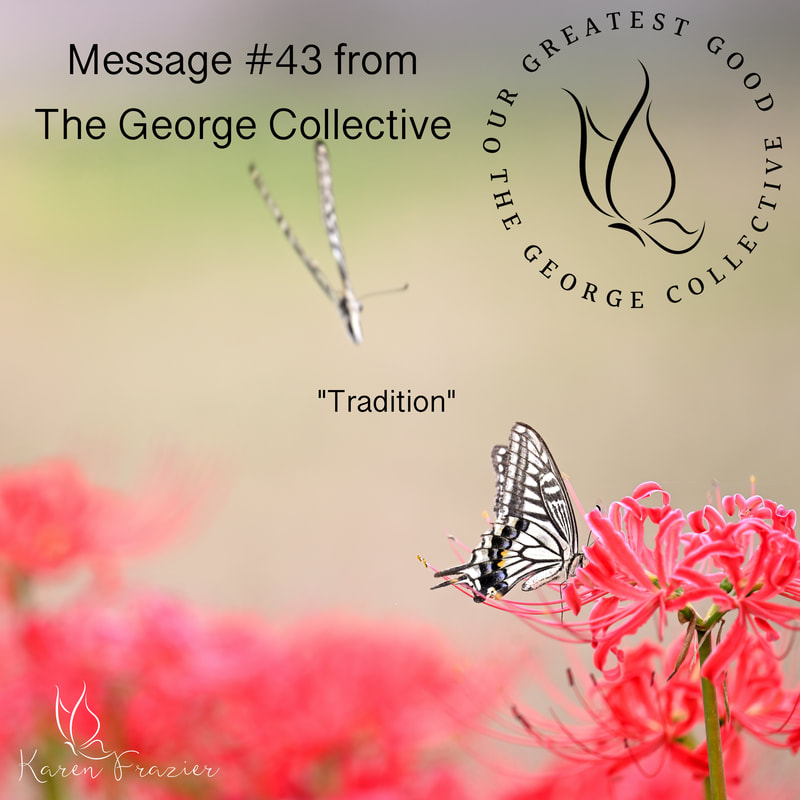|
Who is the George Collective
Go to first message BEGIN CHANNELED MESSAGE Greetings! It is our great pleasure and joy to be here with you Now and share in the energy of the Oneness. We remind you of the Oneness of Source when we communicate through this channel, for we wish for you to re-member, even for a moment, that there is no separation between you, us, all beings, and even that which you call God, which is Source. All that you notice around you is Source energy, forming, shifting, and reforming in a constant dance of creation. And all things that shift, form, shape, break apart, and reform are energetic creations of both individual and collective consciousness from the mind of the universe. You are an integral part of this mind; thus, your creations—both individually and as part of the collective—matter. And by that, we mean both matter in importance and matter in the material sense of creating energetic density that becomes this and that, here and there, now and then, and all things which exist between what you perceive as the polarities of the All That Is. Our message for you Now is about the vibration of tradition. It is something that humanity views with great reverence. For humanity believes it connects the past to the present, and it will connect the present to the future for the purposes of continuity, belonging, and reassurance. Thus, you may be surprised to learn that tradition, while you may believe it generates these positive experiences, does not serve your greatest good. It is frequently used as a tool of oppression, suppression, conditioning, and control, and it keeps humanity rooted in what was instead of allowing you to be present in the Eternal Moment of Now. It blocks the creative process by forcing you to follow a set of choices, ideals, beliefs, thoughts, and behaviors someone else created instead of allowing you the freedom to follow your own creative urges in each Moment of Now. And as more people engage in a tradition, the more the tradition's creations become solidified through individual and collective efforts. This, in turn, keeps you firmly rooted in reliving someone else's past instead of creating your own present. Let us give you an example of a tradition that keeps you rooted in past choices and behaviors and blocks the creative process. It is a tradition called "marriage" that many engage in. Marriage is also referred to as wedlock, and this word reveals the intentions of the tradition. It is an intended locking together of two souls, binding them for life, and for eternity in some religions. When one enters wedlock, they become locked in to making one soul more special than any other soul for a lifetime or into infinity. This limits Love, for Love is infinite and never reserved for only one soul. Around this concept of wedlock, humanity has created both religious and civil laws, originally intended to bind a woman to a man so she could become his property in return for his protection. This built alliances between families, clans, businesses, and sometimes even countries, and aside from these "important" alliances, very little consideration was given to the desires of one or both people entering into the marriage. As humanity has created it, marriage is currently a commitment in which you promise to love one other person above all others (or in the case of polygamous marriages, a finite number of other people), and you agree to do it for as long as you live and perhaps beyond. In doing so, it creates a legal obligation between parties to remain bound until "death do us part," and both civil and religious laws make it difficult to get out of, if you are allowed to at all. This is just the beginning of the problematic nature of wedlock, which also has, in the past, been exclusionary. For example, many countries still only allow marriage between a soul with the biological sex of male and a soul with the biological sex of female. There is also a history of legal banning of marriage between races. In the "Land of the Free," the United States, interracial marriages have only been legalized within the past century (Karen's note: interracial marriage was legalized in 1967 - so only 54 years ago). Setting aside the problematic nature of the tradition of marriage—which is sufficient reason for humanity to rethink the institution—wedlock is also anti-creative. Souls incarnated into human bodies have come to bring the creativity of Source energy to the lives of human beings. And one of the main components of embodied creativity is forming self-definition through the lens of being in relationship to another. On the surface, then, it would appear that marriage is the ideal platform for this type of creation. But it is not. Why? Because marriage begins with the false promise, "I will love you above all others for the rest of my life." The nature of the human soul is Love. You come from Love, and that pure Love energy enters your body at the same time the soul does. And throughout your embodied lifetime, one of the wonders of being a soul in a body is creating expressions of Love through your relationships with others. These expressions of Love are most recognizable in those you define as your loved ones, such as friends, family, pets, and celebrities, but even the definition "loved ones" limits Love, which by its very nature is not only unlimited, but infinite. Thus, promising to love one above all others goes against the very nature of your soul, which is Love of all beings and things, in all ways, through all expressions, at all times. So, while you may not realize it as you make the promise of love, the truth is that it is a false promise. For your nature is Love, and the promises you make as marriage vows actually limit love, which can, in turn, prevent you from experiencing Love while in embodied form. Likewise, marriage creates a sense of obligation. Again, on its surface, it may seem that obligation is a positive ideal, but it limits your freedom of choice and creativity. While humanity considers it a "good thing" to keep one's word, there are many times when keeping your word is not only unhelpful, but it can also be harmful to you, others, or to whomever you have made the vow. For example, is it helpful or harmful to keep a vow to stay together forever when one party is abusive? Does remaining because you made a vow help or harm the abused? Does it help or harm the abuser? If you have signed a contract for a job and you discover afterward the job requires you to engage in dishonest or harmful practices, would you allow yourself to remain for the sake of keeping your word, or would you do everything in your power to break that promise? If you agree to take a job and you enjoy it for a while but then discover it no longer serves the direction you want your life to go, should you remain because you agreed you would work that job, or should you make another choice? The tradition of marriage, then, places limits on your creativity and creates a false sense of obligation based on a vow built on a false premise. Holding onto something because of history and tradition keeps you from being the creative individual you have come to be, and it can lead to resentments in the marital relationship. We wish to tell you this: relationships are meant to be joyful, not painful. They are intended to be collaborative, not restrictive. They are for the purpose of experiencing the embodiment of Love, not the experience of resentment or contempt. Please understand we are not suggesting you do not engage in committed and loving relationships. We are not, because these relationships can be powerful creative forces that allow you to grow, blossom, and expand your definition of who you are. However, we suggest that instead of the tradition of marriage, you consider choosing in every moment to share a life with someone not because a piece of paper, a law, and a vow says you have to, but because that is the call of your soul in that moment. This is how you can create a dynamic and loving partnership that serves both souls, removing the fear-based tradition of wedlock. Tradition is based in the past, and it is rooted in fear. Humanity has created traditions to keep the past alive, yet the past is an illusion. Doing something one way because "this is how it has always been done" generates limitation, not freedom. And any time you experience limitation, even if you call it "tradition," you restrict your ability to create in the Now. Thus, we gently suggest that when you come up against limitation disguised as tradition, you pause a moment and go within to reflect. Ask yourself, "Is this who I am now? Is this what I choose now? Would I choose this if it was not tradition? Would I choose this if was not how it was always done?" Then, feel the vibration of your yes or your no. If the answer remains, "Yes - this is who I choose to be," then by all means, we encourage you to make that choice in this moment. Perhaps in the next moment when the tradition arises again, you may make another choice, or you may make the same one. Either is perfectly acceptable as long as it works for you. But make the choice consciously because it suits who you choose to be and not because it is how it has always been done. You have come into a human body as a creative being in which, in each Eternal Moment of Now, you have the freedom to choose who and what you wish to be. Instruments of conditioning such as traditions can serve to limit this freedom without you even realizing it is happening. Thus, we invite you to examine each tradition as it arises and engage in all thought, word, and deed because your soul is shouting, "Yes!" and not because it's something someone created hundreds or thousands of years ago or even yesterday. If that tradition serves your highest version of yourself, we encourage you to choose it. But do so consciously because it is Who You Truly Are instead of because it is who you once were or who you have always been. We love you. END CHANNELED MESSAGE Image by yamabon from Pixabay Read next message
1 Comment
Steve Thomas
6/20/2021 01:17:53 pm
Your wisdom is most appreciated. If something is not truth or love, why should it be prioritized above these?
Reply
Leave a Reply. |
Categories
All
Archives
December 2022
|
AUTHOR KAREN FRAZIER
- Home
-
Books
- Angel Numbers for Beginners
- Avalanche of Spirits
- Chakra Crystals
- Complete Reiki
- Crystal Alchemist
- Crystals for Beginners
- Crystals for Healing
- Dancing with the Afterlife
- Dream Interpretation Handbook
- Essential Crystal Meditation
- Higher Vibes Toolbox
- Introduction to Crystal Grids
- Little Book of Energy Healing Techniques
- Noisy Ghosts
- Reiki Healing for Beginners
- Transform Your Life with Alchemy
- Ultimate Guide to Psychic Ability
- Usui Ryoho Reiki Manual
- Cookbooks
- Other Books
- Classes
- Connect
- Meditate

 RSS Feed
RSS Feed
